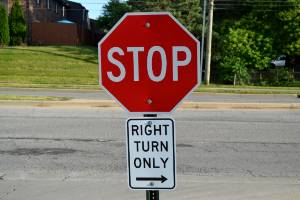Determining Fault for a Right-Turn Auto Accident in New Jersey
Posted on behalf of James Lynch on August 14, 2020 in Car Accident News. Updated on July 11, 2023
 Right turns are not as dangerous as left turns because you are not cutting across oncoming traffic. However, any turn can be dangerous, particularly if you are not careful. Unfortunately, even if you are careful, you could get hit by oncoming traffic.
Right turns are not as dangerous as left turns because you are not cutting across oncoming traffic. However, any turn can be dangerous, particularly if you are not careful. Unfortunately, even if you are careful, you could get hit by oncoming traffic.
It is widely assumed the driver making the turn is almost always at fault. However, sometimes the oncoming driver is to blame for a right-turn crash. Determining who is at fault for a right-turn crash can be complicated, which is why seeking legal representation can be an important step for victims.
The New Jersey car accident lawyers at Lynch Law Firm, PC are available for a free legal consultation. This is your chance to learn more about your potential legal options. We charge no upfront fees for helping injury victims seek financial compensation.
State Laws That Apply to Right-Turn Accidents
The general rule is that oncoming traffic has the right of way. You need to make sure you have enough time to pull out onto the road without causing a crash. Unfortunately, many drivers who are turning right do not take enough time to make sure it is safe to do so before pulling out.
Right-turn accidents often occur when a driver attempts to make a right turn on a red light. However, you can only do this if there is not a “No Turn on Red” sign posted at the intersection.
When you are at a controlled intersection (one with stoplights) attempting to make a right turn, you are required to yield to the driver on the right if you both arrive at the same time. When a driver arrives at the intersection before you, you must yield to him or her.
You are also required to use your turn signal within the last 100 feet before a turn. While oncoming traffic from the left will not see the signal, the driver in the car behind you will. If you fail to use your turn signal, you might be rear-ended by the driver behind you. You could also be held partially liable for the crash.
Best Practices When Making a Right Turn
It is always good to be a defensive driver. That means you should not count on other drivers to do the right things to help prevent a crash.
Defensive driving is particularly important during potentially dangerous traffic maneuvers, like turns. If you are unsure if you have enough time to make a right turn before the oncoming car, you should probably wait for that car to pass. If it looks like an oncoming car is speeding, you should not expect the driver to slow down as he approaches you when you make the turn.
Make sure to come to a complete stop so you can look before making the turn. You should not assume you can just slow down, look quickly and then make the turn. If you do not take enough time to check, you are likely to pull out too soon.
How Could an Oncoming Driver be Held Liable for a Crash?
One reason why the oncoming driver could be held liable is speeding. Even if you pull out and begin making your turn before you should, the oncoming driver could be held partially liable for going too fast.
Another reason a driver could be held liable for a crash is changing lanes in the middle of the intersection. It is illegal to change lanes while passing through an intersection. If an oncoming driver changes lanes and crashes into you while you are turning right, the oncoming driver could be at fault. This is especially true if the lane you were turning into was clear before the other driver changed lanes.
Need Legal Help? Call Lynch Law Firm, PC
We understand there is often a lot of confusion and uncertainty after a car crash. We have helped many car crash victims over the years – we have obtained more than $300 million on behalf of our clients.*
Schedule an initial consultation to learn more about how we may be able to assist you. The consultation is free, and you do not have to hire us afterward. There are no upfront fees for our services.
Give us a call today. We are here to help. (800) 518-0508







